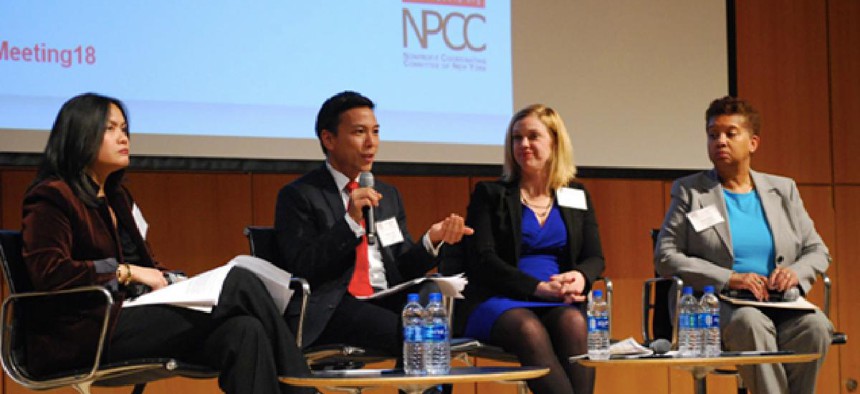Lessons from the 2018 meeting of the Nonprofit Coordinating Committee of New York

left to right
Actively listening, encouraging self-care and offering opportunities for growth are not just good strategies for improving wellbeing, they can also help nonprofits hold on to their staff. These were some of the lessons learned at the 2018 annual meeting of the Nonprofit Coordinating Committee of New York.
Ground-level nonprofit staff members, who spend much of their time providing care and services directly to clients are especially prone to feelings of burnout due to low wages, long hours, emotionally intense work, and a tendency to neglect self-care. Often these direct services workers flee the sector for other endeavors.
“We don’t want you to leave this sector and go work at the Gap. We don’t want you to burn out so much that you say: I just can’t do this “people work” anymore,” said Cristina Harris, program and training manager for MHA-NYC.
Retention is an issue across almost all positions but according to the 2017 Nonprofit Employment Practices Survey 34 percent of nonprofits reported direct services as the most difficult department area for retaining staff.
NPCC chose to focus the informative panel during its annual meeting on retention in order to draw attention to the issue and help nonprofits combat it.
“We’re focused on caring about our people because we know that no matter what happens in the external world, it’s our people who move our work forward,” said Sharon Stapel, president and executive director of NPCC.
“If we’re not taking care of our folks, we’re not sustainable as organizations, and we are not sustainable as a sector,” said Stapel.
The panel was called "Building Members and Building Movements: Caring for Our People," and followed the business portion of the meeting where board members were elected and re-elected. Carmelyn P. Malalis of the New York City Commission on Human Rights moderated the conversation that included leaders of nonprofit service providers and charities.
NPCC New York, which advocates for nonprofits at the state and local levels and helps them improve their operations, defines taking care of nonprofit staff as embracing diversity, equity, inclusion, wellness, and opportunity.
Panelist Patricia Swann, senior program officer at The New York Community Trust, spoke on the uniquely important role staff plays in the nonprofit world. “I can’t think of any other sector where the people, the labor, the workforce, are more critical, and more disproportionately important,” said Swann.
Panelist Kelsey Louie, CEO of Gay Men’s Health Crisis, talked about the importance of hearing what staff members have to say.
“Pizza is great, but feeling listened to is even better,” said Louie, who went on to clarify that listening to his staff does not mean giving them everything they want. “It just means that I understand the difficulty they’re faced with when they don’t get what they want.”
After higher wages, offering opportunities for growth was cited by Louie as the second most important thing to his employees. Louie stated that 77 percent of managers at GMHC were promoted from within. “We want people to grow. We want people to apply for promotions within the organization,” said Louie.
Harris stressed the importance of communication. “Some of the best ways to collectively work as an organization and feel less alone in the work, is to make sure the communication is happening regularly from the top,” said Harris.
Employees at nonprofits are especially prone to burnout and tend to neglect their own self-care. “Sometimes we need to help take care of them because they aren’t taking care of themselves,” said Louie. “We’re the hardest on ourselves, and it takes someone else to believe in us.”
The overall message was that nonprofit leaders need to work hard to ensure that their employees are well-taken care of, and funders need to bear that in mind as well
“It would really be foolhardy to make grants without recognizing the fact that an investment in the people that make this sector is a foundation for everything that we do,” Swann said.
